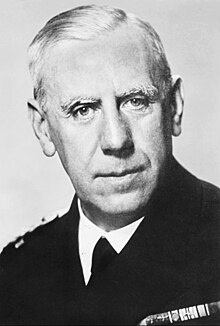Wilhelm Franz Canaris
| Wilhelm Canaris | |
|---|---|
 |
|
| Birth name | Wilhelm Franz Canaris |
| Born |
1 January 1887 , Westphalia, Kingdom of Prussia, German Empire |
| Died |
9 April 1945 (aged 58) Flossenbürg concentration camp, Bavaria, Nazi Germany 49°44′06″N 12°21′21″E / 49.734958°N 12.35577°E |
| Allegiance |
|
| Service/branch |
|
| Years of service | 1905–44 |
| Rank | Admiral |
| Battles/wars |
World War I World War II |
World War I
Wilhelm Franz Canaris (1 January 1887 – 9 April 1945) was a German admiral and chief of the Abwehr, the German military intelligence service, from 1935 to 1944. Initially a supporter of Adolf Hitler, he later turned against the Nazis as he felt Germany would lose another major war. During the Second World War he was among the military officers involved in the clandestine opposition to the Nazi regime. He was executed in Flossenbürg concentration camp for high treason as the Nazi regime was collapsing.
Canaris was born on 1 January 1887 in Aplerbeck (now a part of Dortmund) in Westphalia, the son of Carl Canaris, a wealthy industrialist, and his wife, Auguste (née Popp). Canaris himself believed that his family was related to the 19th-century Greek admiral, freedom fighter, and politician Constantine Kanaris, a belief that influenced his decision to join the Imperial German Navy. While on a visit to Corfu, he was given a portrait of the Greek hero that he always kept in his office. However, according to Richard Bassett, a genealogical investigation in 1938 revealed that his family was actually of Northern Italian descent, originally called Canarisi, and had lived in Germany since the 17th century. His name was of Italian origin, as was later shown in an elaborate family tree. His grandfather had converted from Roman Catholicism to Lutheranism.
In 1905, at the age of seventeen, Canaris joined the Imperial Navy and by the outbreak of the First World War in 1914 was serving as an intelligence officer on board the cruiser SMS Dresden, a light-cruiser he was assigned to in December 1911. This was the only warship that managed to evade the British Royal Navy for a prolonged period during the Battle of the Falkland Islands of December 1914, largely due to Canaris' skilful evasion tactics. After the Battle of Más a Tierra, the immobilized Dresden anchored in Cumberland Bay, Robinson Crusoe Island and contacted Chile with regard to internment. While in the bay, Royal Navy ships approached and shelled the Dresden. The crew scuttled the ship. Most of the crew was interned in Chile in March 1915, but in August 1915 Canaris escaped by using his fluency in Spanish. With the help of some German merchants he was able to return to Germany in October 1915. On the way, he called at several ports, including one at Plymouth in Great Britain.
...
Wikipedia
